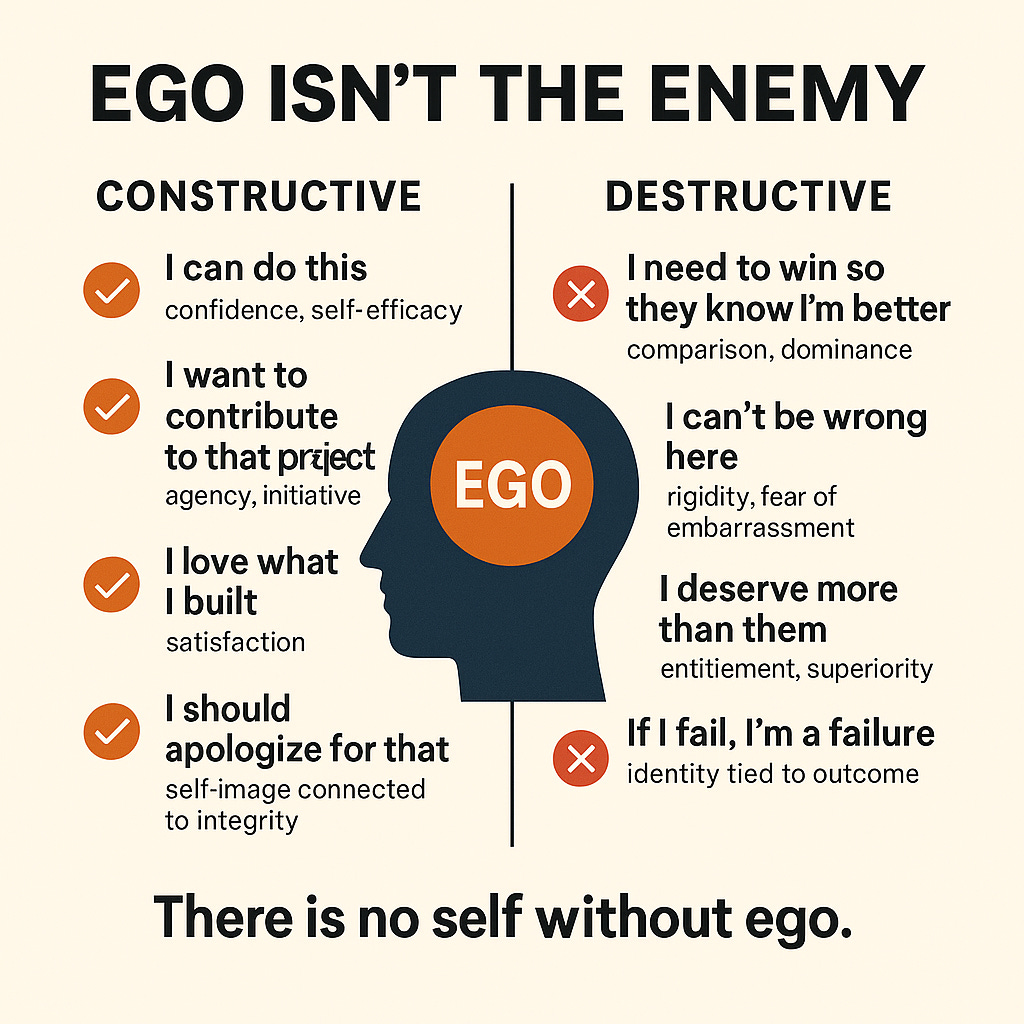Ego Is Not The Enemy
Unless you don't know your ego
I recently came across a book called Ego Is The Enemy. My first reaction: that was a pretty silly title. Ego isn’t inherently the enemy. I then learned it was about American Apparel and the founder being consumed by his ego (paraphrasing). His ego turned into his enemy, but not just by being ego. It became his enemy because he had no awareness of his ego so he couldn’t identify when it was getting out of control.
That’s the real danger. Ego, unmanaged, can sabotage you in the pursuit of self-expansion and self-glory.
Ego is a part of our operating system. It’s completely required, but incomplete in it’s perspective. It’s the source of our confidence and decision making. No, there’s no true self that can make decisions and have real confidence. Literally the brain pathways, that have been identified and studied, that allow us to make any decision at all, including to rise out of bed, to brush our teeth, to get dressed, are part of the ego. We must have a functioning ego to function in the world.
Some people narrowly define ego as only it’s negative excesses - pride, arrogance, selfishness. Don’t fall into this trap. Ego can be these villains, but it’s also the structure below us.
There is no self without ego. The only part of the brain active when saying ‘I’ is ego. I do believe in The Collective Puzzle and our connection with everything around us so we can wax philosophic about possibilities of existing without an ‘I.’ In the real world, however, we need that separation in our mental models to also recognize ‘others.’ Maintaining the boundary between me and not me is crucial to empathy and self-protection. Too much ego, though and again, crushes empathy in the pursuit of self-glory.
So the work is not to ‘kill the ego,’ but to ‘monitor the ego.’ Awareness of what parts of your thoughts are driven by ego and judgement on if those thoughts serve your Puzzle and the life you want.
Constructive ego thoughts:
I can do this (confidence, self-efficacy)
I want to contribute to that project (agency, initiative)
I love what I built (satisfaction)
I should apologize for that (self-image connected to integrity)
Destructive ego thoughts:
I need to win so they know I’m better (comparison, dominance)
I can’t be wrong here (rigidity, fear of embarrassment)
I deserve more than them (entitlement, superiority)
If I fail, I’m a failure (identity tied to outcome)
The underlying pattern is the same - ego attaches meaning to “me” and either builds or guards it. The good side of ego gives you a stable mental model of yourself to act from. The bad side warps everythign into validation-seeking or self-preservation at all costs.
When I first started learning about ego in my 20s, it was from spiritual literature that defined it as the enemy. There was a ton of guidance available on how to ‘destroy your ego!’ Recognizing that my ego was probably causing problems for me, at the time, and was probably over-developed I decided to embark on a journey to destroy it.
I forget which activities I chose, but in the course of a few weeks, maybe months, I felt like I had successfully destroyed my ego! I felt like I was at peace with the world and needed nothing from it. Everything was as it should be. Which felt serene at first, but also started to cause just as much trouble as my overactive ego. I was running a business, after all. Nothing seemed to matter anymore and boy did my business need me to think it mattered.
There’s a tension in entrepreneurship between the anxiety of failure and satisfaction of success that creates the space for continued action. And act we must. These ‘passive income’ businesses feel like deciding to not participate in one of the greatest endeavors of life - making a difference. Even if I never actually make a difference I still want to strive for it. And ‘making a difference’ is intentionally obtuse so as to not be attainable. And, of course, there are myriad ways to make a difference outside of business and I include those in my efforts. I’m just saying if I’m going to be in a business there’s nothing that will be passive about it.
People would ask me questions and I’d just say “I don’t know.” Then they’d say “well you’re the only one who can make this decision, so….” and I was paralyzed. I literally could not make this decision that my business absolutely needed. That’s when I realized I had gone too far. That’s when I dug deeper into the meaning and science of ego.
Since then I try to constantly walk the line between indecision and arrogance. I want a healthy vision of myself which includes caring for the people around me, caring for the planet, and always making decisions that benefit The Collective Puzzle.


